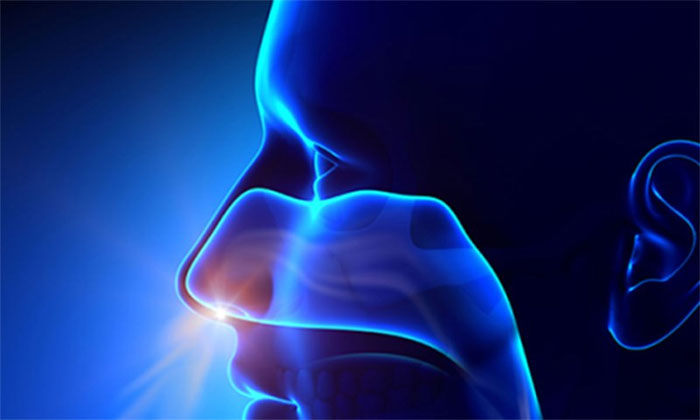New discovery on the cause of loss of smell because of Covid-19
According to research from experts in the US, the loss of smell and taste when infected with Covid-19 is not directly caused by the virus, but by inflammation.
Loss of smell and taste became obvious symptoms in people with Covid-19 at the beginning of the pandemic, even after that, becoming a sequelae. Researchers are still figuring out why this happens.
An autopsy study published in the journal JAMA Neurology on April 13 found that the loss of smell and taste when infected with Covid-19 was not caused by a virus.

Loss of smell, taste become obvious symptoms in people with Covid-19.
The study analyzed data from the nose, nerves and brain of 23 people who died from Covid-19. This result is said to be the most detailed assessment of the impact of nCoV on the human olfactory and taste system.
Scientists at Johns Hopkins University, USA, concluded that non-viral inflammation is the cause of the loss of smell and taste during and after Covid-19 infection. It shows that anti-inflammatory drug treatments can prevent serious or long-term damage to these organs.
This finding is based on combining multiple data on the effects of SARS-CoV-2 on the human sense of smell. Some previous data suggested that the virus could infect nerves that carry odor signals to the brain, called olfactory neurons. Therefore, sensory loss may be due to direct infection. However, in the new study, the authors found that the virus was not present in these neurons.
23 corpses of people with Covid-19 including 9 people who completely or partially lost their sense of smell and taste. They found this by examining olfactory neurons in the lining of the nose, blood vessels, and the number of olfactory axons in each patient. The authors also looked at injuries to the olfactory bulb, the part of the brain that receives olfactory signals, and determined if SARS-CoV-2 was present.
They compared the study results with 14 people who died of other causes and did not have Covid-19 and had no loss of smell or taste.
Compared with the control group and F0 without any change in smell and taste, Covid-19 patients who lost their sense of smell and taste experienced more damage to the nasal mucosa and blood vessels. Meanwhile, the number of olfactory axons was significantly less.
However, this damage to the olfactory tissue was not related to the severity of the disease. In addition, only 3/23 patients had genetic material of nCoV in the sense of smell. Of these three, only one reported loss of smell. The other two did not lose their taste buds. These results suggest that "olfactory pathology is not directly caused by viruses".
According to the authors, their findings suggest that nCoV infection in the olfactory epithelium leads to inflammation. From there, inflammatory nodules damage nerve cells, reduce the number of axons that send signals to the brain, and eventually lead to olfactory dysfunction.
Olfactory dysfunction can be so severe that it causes long-term loss of smell and taste, or even permanent damage. This result also offers new hope in the treatment of persistent Covid-19 symptoms. That is if the cause of the loss of smell and taste is caused by inflammation and not directly by a virus, we can use anti-inflammatory agents to treat it.
- New findings on loss of smell and taste when infected with Covid-19
- Loss of appetite reduces desire
- US newspaper: Detecting extremely simple symptoms to identify people suspected of covid-19 infection
- Do not smell anything - unexpected signs of dying
- The ability to smell poorly is at risk of premature death
- The sense of smell helps birds navigate when flying at sea
- Forget the smell of lovers, watch out for memory loss!
- People are losing their sense of smell because of pollution
- Urticaria after Covid-19, how to treat?
- People smell 10 kinds of smell
- To avoid nightmares, smell the roses
- New discovery about 'virtual smell'
 March 2012: Launching H5N1 vaccine for poultry
March 2012: Launching H5N1 vaccine for poultry Experts comment on the mysterious gradual disappearance of the Delta variant in Japan
Experts comment on the mysterious gradual disappearance of the Delta variant in Japan Danger of the two Delta . branch variants
Danger of the two Delta . branch variants 2020 pandemic flu attack humans?
2020 pandemic flu attack humans? New discovery about cancer detection ability of bees and dogs
New discovery about cancer detection ability of bees and dogs  New findings on loss of smell and taste when infected with Covid-19
New findings on loss of smell and taste when infected with Covid-19  Why do we often associate memories with scents?
Why do we often associate memories with scents?  The sense of smell is man's fastest danger warning system
The sense of smell is man's fastest danger warning system  US newspaper: Detecting extremely simple symptoms to identify people suspected of covid-19 infection
US newspaper: Detecting extremely simple symptoms to identify people suspected of covid-19 infection  Tips deodorant moldy mold indoors
Tips deodorant moldy mold indoors 